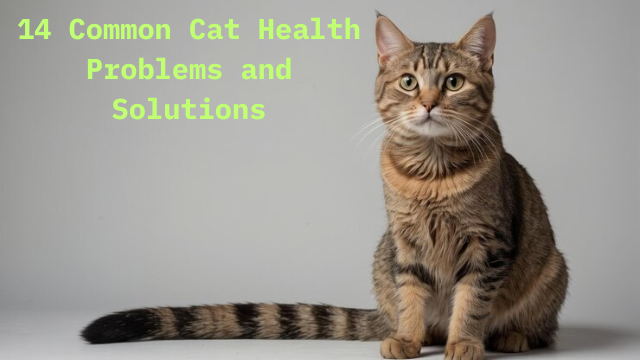All cat owners should be aware of common health issues. Cats are adept at disguising sickness. Being aware of prevalent problems can aid in early detection. This blog will cover the most common health issues in cats. It will also cover their causes, signs, and cures. You will learn how to maintain your cat’s health on time.
Common Cat Health Problems and How to Address Them
Fleas: Little Disruptors
Fleas are tiny, bothersome parasites. In severe situations, they can induce anemia and cause itching skin.
- Symptoms: Itching, red skin, hair loss, and black flea dirt.
- Causes: Humans, animals, and environments can all harbor fleas.
- Treatment: Use flea sprays, keep your house tidy, and apply flea and tick treatments.
Tapeworm: The Undiscovered Enemy
cat health problems internal parasites are tapeworms. They live in the intestines of your cat.
- Symptoms: Scooting, vomiting, and weight loss.
- Causes: Cats get tapeworms by eating hosts like fleas or rodents.
- Treatment: Regular flea control and deworming medications.
Dental Conditions: A Quiet Danger
In cats, dental disease is frequent. Their teeth and gums are also affected.
- Symptoms: Red gums, bad breath, and refusal to eat hard food.
- Types: Gingivitis, periodontitis, and tooth resorption.
- Treatment: Veterinary dental care and routine tooth brushing.
Painful Urination in Felines with Lower Urinary Tract Disease (FLUTD)
FLUTD is a frequent disorder that affects the urethra and bladder.
- Symptoms: Painful urination, frequent urination, and blood in the urine.
- Causes: Inflammation, diet, and urinary tract infections.
- Treatment: Fluid therapy, dietary changes, and sometimes catheterization.
Obesity in Cats: The Serious Problem
Cat obesity is becoming a bigger issue. It may result in further cat health problems.
- Symptoms: Joint pain, difficulty moving, and diabetes.
- Causes: Overfeeding and lack of exercise.
- Treatment: Controlled feeding, regular exercise, and veterinary monitoring.
Diabetes in Cats: Sugar Problems
Cats with diabetes have altered insulin sensitivity or production.
- Symptoms: Weight loss, increased thirst, and nerve damage.
- Types: Type I (lack of insulin) and Type II (poor insulin response).
- Treatment: Insulin therapy, dietary changes, and regular monitoring.
Pancreatitis in Cats: Inflammatory Disorders
Pancreatitis is the term used to describe inflammation of the pancreas. It may be chronic or acute.
- Symptoms: Vomiting, lethargy, and abdominal pain.
- Causes: Chronic intestinal disease or diabetes.
- Treatment: Hydration, anti-nausea medication, and nutritional support.
Weak Immune System: Feline Immunodeficiency Virus (FIV)
Cats with FIV have weakened immune systems and are more vulnerable to infections.
- Symptoms: Fever, depression, and poor coat condition.
- Transmission: Through bite wounds from infected cats.
- Treatment: No cure, manage symptoms, and regular veterinary visits.
Heartworm: Unknown Risk
Parasites called heartworms live in blood vessels and the heart.
- Symptoms: Weight loss, trouble breathing, and coughing.
- Causes: Mosquito bites.
- Treatment: Preventative medication and sometimes surgical removal.
Polycystic Kidney Disease: Genetic Issues
Kidney cysts filled with fluid are a result of polycystic kidney disease.
- Symptoms: Excessive thirst, weight loss, and poor appetite.
- Causes: Genetic inheritance, especially in Persian cats.
- Treatment: Surgical draining of cysts, diet control, and fluid therapy.
The Feline Leukemia Virus (FeLV) is a Virus that can be Fatal
FeLV can cause cancer in cats and has an impact on their immune systems.
- Symptoms: Poor coat quality, weight loss, and enlarged lymph nodes.
- Transmission: Through bite wounds and shared bowls or litter boxes.
- Treatment: No cure, vaccination, and managing symptoms.
Rabies: Deadly Contagion
A deadly virus that damages the nervous system is rabies.
- Symptoms: Excessive drooling, aggression, and paralysis.
- Causes: Bites from infected animals.
- Treatment: Vaccination and keeping cats indoors.
Common Colds are Upper Respiratory Infections
Upper respiratory infections are like the common cold for cats.
- Symptoms: Sneezing, runny nose, and congestion.
- Causes: Viral, bacterial, or fungal infections.
- Treatment: Medication and humidification.
Cancer: A Dangerous Encounter
Cancer may affect a cat’s body in several places.
- Types: Skin cancer, lymphoma, and bone cancer.
- Symptoms: Lumps, swelling, and lethargy.
- Treatment: Surgical removal, radiotherapy, and chemotherapy.
Preventative Steps for the Health of Cats
- Regular veterinary check-ups
- Proper diet and exercise
- Preventative medications and vaccinations
- Keeping the living environment clean
Conclusion
Understanding and addressing common cat health problems can keep your feline friend healthy and happy. Regular check-ups and preventative measures are key. Always consult your vet if you notice any unusual symptoms.
FAQs
What is a common serious health problem in cats?
A common serious cat health problems is feline lower urinary tract disease (FLUTD). It causes painful urination and can lead to severe complications if not treated.
Why would an indoor cat get sick?
Indoor cats can get sick from various factors like poor diet, lack of exercise, stress, or exposure to other sick animals. Indoor environments can also have allergens and toxins.
What is the most common disease that cats get?
The most common disease that cats get is dental disease. It affects a cat’s gums and teeth, causing pain and infection.
Will a sick cat get better on its own?
A sick cat often needs medical attention. While some minor issues might resolve, most cat health problems require a vet’s diagnosis and treatment.
What cat breed is the most unhealthy?
Persian cats are among the most unhealthy breeds. They are prone to genetic conditions like polycystic kidney disease and respiratory issues cat health problems.
What are some common health problems for cats as they get older? What are the symptoms?
Older cats often suffer from arthritis, kidney disease, and hyperthyroidism. Symptoms include joint pain, weight loss, increased thirst, and changes in behavior.
What are the top 10 most common health problems for cats?
- Fleas
- Tapeworm
- Dental Disease
- FLUTD
- Obesity
- Diabetes
- Pancreatitis
- FIV
- Heartworm
- Polycystic Kidney Disease
Why is it so hard to find a male calico cat without serious cat health problems?
Male calico cats are rare due to their genetic makeup. They often have Klinefelter’s syndrome, which can lead to various cat health problems.
Which cat breed has the least health problems?
The American Shorthair is considered one of the healthiest cat breeds. They are hardy and have fewer genetic health issues in cat health problems.

